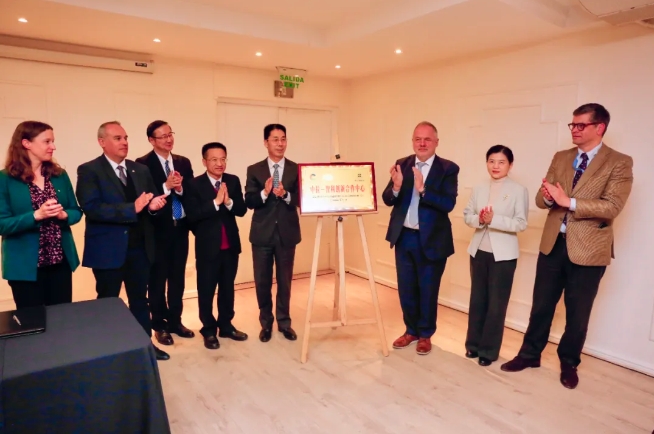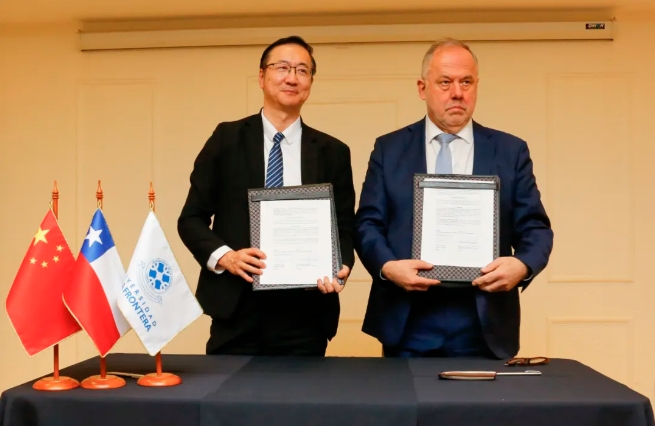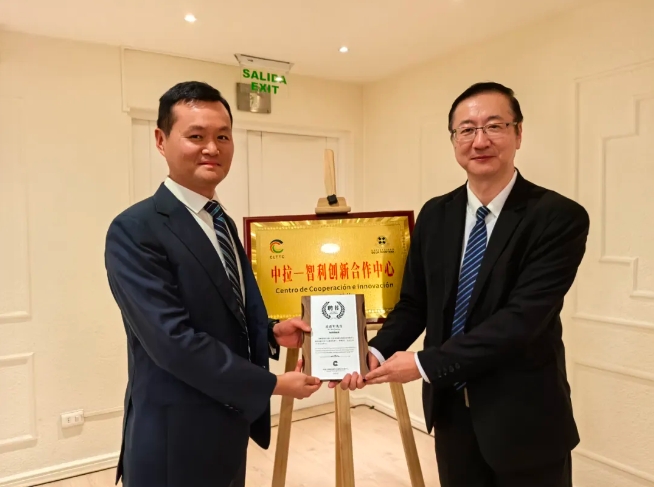On the afternoon of July 26th, local time, the “Centro de cooperacion e lnnovacion China-chile”, a branch of the China-LAC Technology Transfer Center (hereinafter referred to as the “CLTTC”), was officially inaugurated in Santiago, the capital of Chile. This marked the beginning of a new chapter in scientific and technological innovation cooperation between China and Chile, opening up broader prospects for cooperation between the two countries.
At the event, Ambassador Niu Qingbao of the Chinese Embassy in Chile, First Secretary Xu Yunzhe of the Cultural Section, and Second Secretary Zhu Chao of the Political Section, as well as representatives of a domestic delegation led by Gong Guoping, Secretary of the Party Committee of Department of Science and Technology of Guangdong Province, and Li Jun, Vice Mayor of Dongguan City, attended the lauching ceremony. Chilean guests included senior officials such as Hellmut Lagos, Director of the Science, Technology, and Innovation Department of the Ministry of Foreign Affairs, demonstrating Chile's high attention to this exchange and cooperation.

Ambassador Niu Qingbao outlined the solid foundation and broad prospects for cooperation in scientific and technological innovation between China and Chile, and expressed his expectations for the “Centro de cooperacion e lnnovacion China-chile” to promote scientific and technological cooperation between the two sides. Secretary Gong Guoping introduced Guangdong Provinc’'s outstanding achievements and development plans in scientific and technological innovation and international cooperation, emphasizing the vision for strengthening cooperation with Chile. Vice Mayor Li Jun shared Dongguan’s achievements in the information industry and intelligent manufacturing, and expressed the desire to promote in-depth interaction with Chile through the center.
During the event, the delegation held friendly talks with representatives of the Universidad de la Frontera in Chile and the Chinese Embassy in Chile. All parties expressed their full support for the work of the "Centro de cooperacion e lnnovacion China-chile" and their commitment to promoting in-depth cooperation between the two sides in scientific and technological innovation, agriculture, education, culture, and other fields.
Witnessed by all parties, CLTTC and the Universidad de la Frontera signed a letter of intent for cooperation, and held an unveiling ceremony and the appointment ceremony for Dr. Wu Qingjun, the person in charge of the construction of the cooperation center. This marked the official operation of the “Centro de cooperacion e lnnovacion China-Chile”, which has become an important part of the China-LAC Technology Transfer Collaboration Network.


“Centro de cooperacion e lnnovacion China-chile” will be dedicated to building a resource matching service platform between China and Latin America, establishing a talent exchange mechanism, and promoting in-depth cooperation between the two sides in scientific and technological cooperation, cultural exchanges, commercial and trade activities, and other fields. The center will establish a normalized exchange mechanism to provide full-chain services such as policy consultation and legal support for both sides; build a resource matching platform to promote cooperation among universities, enterprises, and scientific research institutions; establish a talent exchange mechanism to promote the bidirectional cultivation of outstanding talents between China and Chile; and actively facilitate cooperation in technology transfer projects, achievement transformation projects, scientific research projects, and other areas.
The cooperation between the CLTTC and the Universidad de la Frontera this time not only received strong support from the Guangdong Provincial Science and Technology Department and the Dongguan Science and Technology Bureau but also received a positive response from the Universidad de la Frontera. As an excellent public university, the Universidad de la Frontera has rich experience and resources in scientific and technological innovation and international cooperation. Its participation will provide strong support for the operation of “Centro de cooperacion e lnnovacion China-chile”.
During their visit to Chile, representatives of CLTTC conducted a series of inspections and exchange activities together with leaders from the Guangdong Provincial Science and Technology Department and Dongguan City. The delegation visited the Pontificia Universidad Católica de Chile and the Millennium Institute on Immunology and Immunotherapy, a leading institution in Chile's biomedical field. The delegation had in-depth exchanges with experts from the institute, learned about the cooperation between Chinese biomedical technology and Chile, and explored the potential for cooperation between the two sides in immunology and immunotherapy.

In addition, the delegation also visited the Chilean Chinese Chamber of Commerce and the Chilean Dongguan Chamber of Commerce, holding talks with representatives of local Chinese chambers of commerce. These exchanges not only strengthened connection with the local Chinese community but also provided valuable resources and information for the future development of the Centro de cooperacion e lnnovacion China-Chile.

This visit aimed to provide solid resource support for the work of the Centro de cooperacion e lnnovacion China-chile. Through in-depth exchanges with local enterprises and research institutions, the delegation not only deepened its understanding of the Chilean market and technological environment but also laid the foundation for future cooperation. With the continuous deepening of China-Latin America cooperation, the Centro de cooperacion e lnnovacion China-chile will rely on its unique geographical location and resource advantages in the future to build a more solid platform for cooperation between China and Latin America, achieve more substantial results in technology transfer, innovation cooperation, and talent cultivation, and promote mutually beneficial and win-win development and common progress between the two sides.

